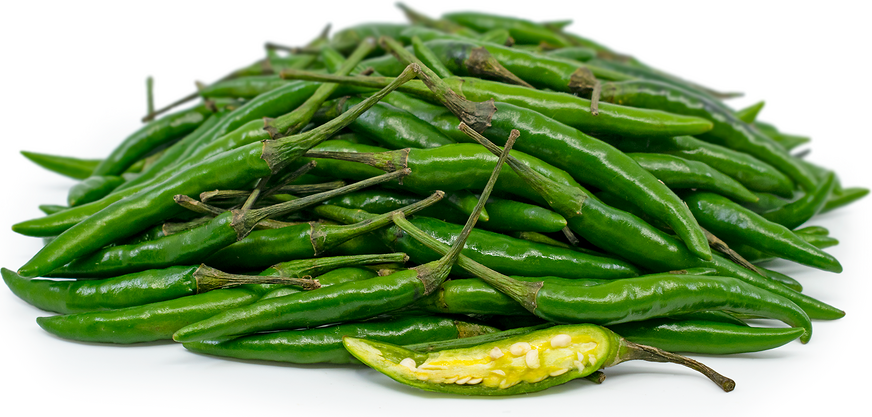


Green Thai Chile Peppers
Estimated Inventory, 10 lbs : 5.14
This item was last sold on : 07/29/25
Description/Taste
Green Thai chile peppers vary in size and shape, depending on the specific variety, and are generally small, conical, and slender, tapering to a point on the non-stem end. The pods range in length from 2 to 7 centimeters, and the skin is smooth, taut, and waxy, ripening from green to bright red when mature. Underneath the surface, the flesh is thin, crisp, and pale green, encasing a central cavity filled with small, round, and flat cream-colored seeds. Green Thai chile peppers have a subtly earthy and grassy flavor with an immediate, pungent heat.
Seasons/Availability
Green Thai chile peppers are available year-round.
Current Facts
Green Thai chile peppers, botanically classified as Capsicum annuum, are young pods that are harvested prematurely and belong to the Solanaceae or nightshade family. The name Thai chile is a general descriptor used to encompass many different varieties of peppers that are commonly used in Thailand that share a similar spice level, appearance, and size. There are two main varieties of Thai chile peppers found in commercial production today, including prik kee noo suan, also known as the “mouse dropping pepper,” a name given for their small size, and prik chee fah or red spur chile pepper. Thai chiles are also sometimes known as Bird’s Eye or simply Bird chile pepper, which is a nickname given as a result of their unique appeal to birds. Throughout Thailand, Green Thai chile peppers have been widely adopted into traditional cuisine since their introduction in the 15th and 16th centuries and have a moderate to hot level of spice, ranging 50,000-100,000 SHU on the Scoville scale. Green Thai chile peppers are predominately used as flavoring and spice in pastes, curry sauces, and infused oils.
Nutritional Value
Green Thai chile peppers are a good source of potassium, which can help regulate fluid levels in the body, vitamins A, C, B6, and K, and copper. The peppers also contain capsaicin, which is a chemical compound that triggers the brain to feel the sensation of heat or spice. Capsaicin has been shown to provide anti-inflammatory benefits.
Applications
Green Thai chile peppers are best suited for both raw and cooked applications such as stir-frying and sautéing. The peppers can be minced and blended into hot sauces, pastes, marinades, and dressings, or they can be placed whole into oils to create an earthy infusion. Green Thai chile peppers can also be used whole in curries, soups, and sauces to add subtle flavor and heat, or they can be stir-fried with vegetables and meat for spicy flavoring. For a more intense heat, the peppers can be diced before use to release their oils and seeds fully. In addition to fresh and cooked applications, the peppers can be dried, ground into a powder, and utilized as a seasoning, or they can be pickled for extended use as a condiment. Green Thai chile peppers pair well with green papaya, citrus, cabbage, carrots, sweet potatoes, fish sauce, vinegar, garlic, onion, herbs and spices such as ginger, curry leaves, turmeric, cardamom, Thai basil and coriander, coconut, and meats such as lamb, chicken, beef, and seafood. The fresh peppers will keep up to two weeks when stored whole and unwashed in the crisper drawer of the refrigerator.
Ethnic/Cultural Info
In Thailand, Green Thai chile peppers are seen as a flavoring agent and are an ingredient in prik nam pla, which is a sauce commonly used in home cooking and at restaurants. There are many different variations of this sauce with each chef following their own recipe, but the sauce typically combines the peppers with fish sauce, lime juice, sugar, and garlic. Spicy condiments are an important aspect of Thai cooking in order to bring balance, flavor, and depth to cooked meats, soups, curries, and noodle dishes. Green Thai chile peppers are also one of the major components of green curry paste and are blended with lemongrass, basil, spices, galangal, and garlic as a base paste mixture. The paste can then be mixed with other ingredients to create flavorful curries; a popular Thai meal served with steamed rice.
Geography/History
Green Thai chile peppers are descendants of spicy peppers native to South America that have been growing wild since ancient times. The original pepper varieties were introduced to Southeast Asia in the 15th and 16th centuries via Portuguese explorers, and since their introduction, the peppers have been selectively bred over generations to create many of the varieties that are labeled as Thai chile peppers today. Green Thai chile peppers are extensively cultivated across Thailand, grown commercially on hillsides, terraces, and in irrigated paddy fields after the rice-growing season, and are sold in local markets. The peppers are also commonly grown in home gardens. Outside of Thailand, Green Thai chile peppers are grown in Europe and North America and are sold through specialty grocers and farmer's markets. They are also sold in canned form in select grocers.
Featured Restaurants
Restaurants currently purchasing this product as an ingredient for their menu.
| C 2 C | San Diego CA | 619-972-9345 |
| Bencotto Italian Kitchen | San Diego CA | 619-822-5493 |
| UCSD Health East campus | San Diego CA | 619-578-3373 |
| Green Dragon Tavern & Museum | Carlsbad CA | 760-797-5579 |
| Stone Brewing World Bistro & Gardens | Escondido CA | 915-861-2297 |
| Brine Time | El Cajon California | 619-495-1493 |
| Cellar Hand | San Diego CA | 334-689-2388 |
| Animae | San Diego CA | 619-925-7908 |
| Counterpoint | San Diego CA | 619-564-6722 |
| Huntress (Bar) | San Diego CA | 619-955-5750 |
| Shoreside Support Boat | San Diego CA | 704-277-7929 |
| Addison Del Mar | Del Mar CA | 858-350-7600 |
| Callie | San Diego CA | 619-947-9036 |
Recipe Ideas
Recipes that include Green Thai Chile Peppers. One




